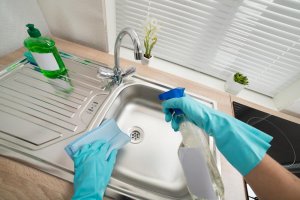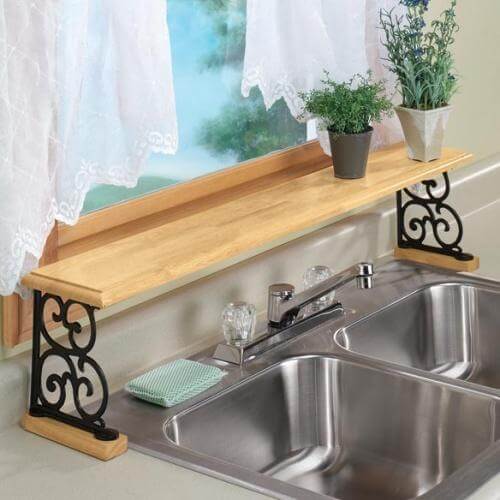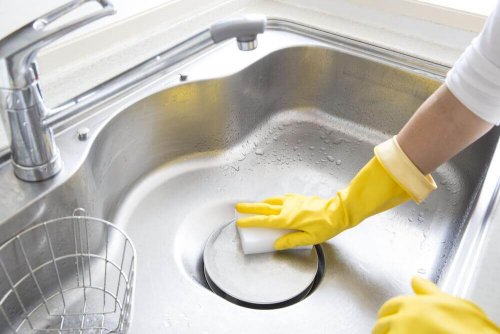Six Ways to Clean and Disinfect the Sinks in Your Home

Sinks are one of the places that build up the most bacteria. Due to the fact that they’re in constant contact with moisture and, in case of kitchen sinks, food scraps, it’s very useful to know how to clean and disinfect the sinks in your home.
Household hygiene is very important for the health of all its inhabitants. For this reason, it’s essential to meticulously clean each space, including the kitchen, bathroom, and laundry sinks.
These are sources of many bacteria, given their own characteristic functions. In this article, we’ll tell you how to clean and disinfect them appropriately.
Six Ways to Clean and Disinfect the Sinks in Your Home

1. Clean and disinfect your sinks with mild soap
This is one of the classic alternatives everyone is familiar with.
- Dilute neutral soap in hot water.
- Soak a kitchen towel in the mixture and clean your sinks with them.
- After that, rinse with water and finally dry them with a dry kitchen towel.
This is the perfect option for stainless steel sinks.
Using neutral soap is also recommended for synthetic or plastic sinks. To clean these types of sinks, just follow the same procedure.
Take a look at this article: How to Clean Your Home with Lemon Juice
2. Baking soda and lemon
You can use these two amazing products to clean your stainless steel sinks. On one hand, baking soda will allow you to remove food scraps and grease easily.
- Combine it with water to form a paste and scrub the entire sink with it using a soft sponge.
- Then, rinse with water.
On the other hand, lemon is very effective to remove rust stains that may appear in the faucets. It will also make your sink shine. Apply it directly onto the surface with a soft sponge.
Avoid using abrasive sponges, since they may scratch the surfaces. Also, try to be careful with hypochlorite bleaches, as well as salt, vinegar, or any other substance that may be corrosive.
3. Vinegar
Vinegar is a natural antibacterial agent. Therefore, it’s a great idea to use it to disinfect sinks.
- To reap its benefits, you just have to apply some white vinegar on a sponge.
- Scrub the stainless steel sink and the adjoining surfaces with the sponge.
- After that, rinse.
4. Options for cleaning granite sinks
These types of sinks are highly recommended due to the fact that they’re long-lasting. In addition, they’re very clean and make any space pop.
To wash and disinfect your granite or marble sinks, the best option is to use a mild liquid soap. Use a soft cloth or a sponge to clean dirt and grime in a matter of minutes.
You should never use abrasive cleaners.
5. Synthetic or composite sinks

Synthetic sinks and those manufactured with resin composite are characterized by their durability. In addition, they’re very easy to clean and disinfect.
Once again, use non-corrosive mild soaps to clean them. As sinks are smooth surfaces, you shouldn’t use steel wool or any other element that can irreparably scratch them.
Drying the sink after each use is a way of prolonging its useful life.
You should also read: 5 Cleaning Tricks if You Don’t Like to Clean
6. How to clean and disinfect glass sinks
Glass sinks have become really popular options for bathrooms nowadays. However, many people wonder what the right way to clean them is.
The answer is simple. It’s recommended to use glass cleaners or a water and vinegar mixture. After a thorough clean and rinse, just dry your glass sink with a dry kitchen towel.
Final Considerations
Overall, plain soaps and natural elements such as baking soda, vinegar, and lemon adapt to most sink cleaning and disinfecting demands.
Also, avoid metal objects that can scratch or stain sink surfaces. Finally, remember that abrasive cleaning products act as sandpaper and can irreversibly corrode materials.
This text is provided for informational purposes only and does not replace consultation with a professional. If in doubt, consult your specialist.








